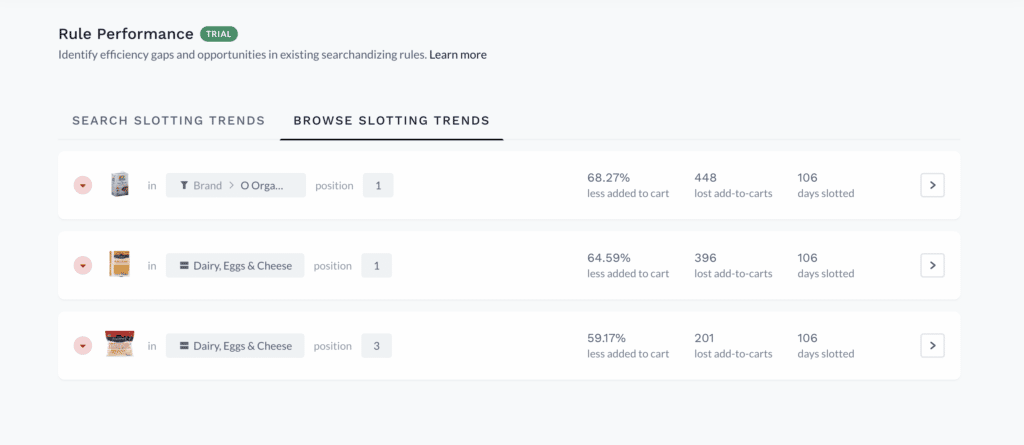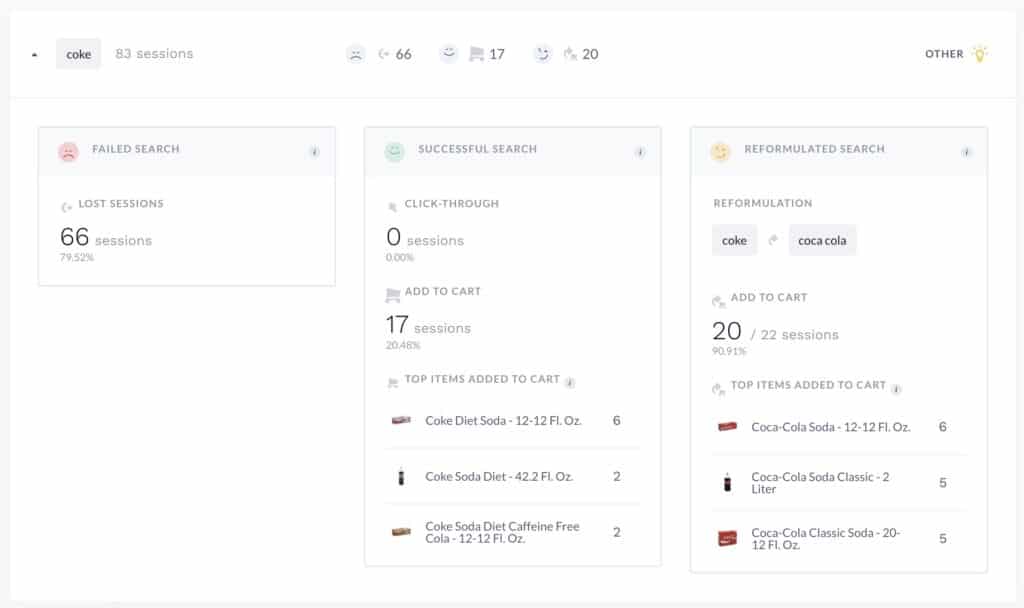Imagine a world where you can match your ecommerce customers’ intent at scale. A world in which every customer is returned the right products in less time. And it doesn’t require much of any extra leg work from your hardworking merchandising team.
All of this is thanks in part to intelligent search, but more so to search intelligence.
Do you know the difference between the two? And how search intelligence can maximize business outcomes while saving your team countless hours on the back end?
Join along as we share how search intelligence is streamlining the future of merchandising activities, both creating a more personalized front-end experience and helping you hit your key business metrics.
Table of Contents
Does Your Intelligent Search Solution Actually Offer Search Intelligence?
How Search Intelligence Can Maximize Business Outcomes
- Identifying Opportunities for Merchant Intervention
- Automating Merchandising Grunt Work
- Warning Merchants of Potential Oversights
It’s Not Intelligent Search OR Search Intelligence. It’s Both.
Does Your Intelligent Search Solution Actually Offer Search Intelligence?
When product discovery vendors flex intelligent search as one of their differentiators, what they really mean is that their solution is AI-powered. Unfortunately, “artificial intelligence” is often just a marketing buzzword without much under the hood.
Internal product discovery engines that are truly AI-powered use first-party data, search history, natural language search, and shopping behaviors to rank results in real-time and simultaneously optimize for specific business KPIs, like conversion rate, revenue, or profit. Leveraging this combined data also reduces friction in the buying cycle and allows for better detection of user intent.
In other words, site visitors are returned more attractive products and rewarded with a more personalized user experience—which 70% of consumers now expect.
But be warned: intelligent search is not synonymous with search intelligence.
Search intelligence is a feature that automatically retrieves analytics and insights from the data your product discovery solution collects. So instead of your merchandising team having to manually go in and connect the dots from the data your platform collects, search intelligence surfaces them for you 24/7.
When leveraged in conjunction with intelligent search, you can maximize business outcomes and hit key ecommerce metrics. Here’s how.
How Search Intelligence Can Maximize Business Outcomes
In a nutshell, search intelligence allows merchants to have a more in-depth awareness of the data surrounding their products and a better understanding of when to take action on different rules.
Let’s dig into some core search intelligence benefits:
Identifying Opportunities for Merchant Intervention
When you enter your product discovery dashboard, you may see basic analytics in the form of graphs, tables, etc. But even most enterprise search solutions don’t provide an in-depth awareness of the data surrounding ecommerce products.
Furthermore, you don’t automatically receive tips on when to take action on certain search queries or synonyms so you can ensure you’re hitting your KPIs.
With search intelligence, this changes.
Search intelligence allows merchandisers to better understand their analytics and how to make better decisions. So when you slot, boost, or bury products, search intelligence tells you how your rules are trending and the type of impact they’re having across the board.

For example, in the image above, the first rule has negative add-to-carts. A search intelligence solution will be able to show you not only how that’s determined, but also what your team should do about it. With negative add-to-carts, should this product be manually slotted in the first position, or would it be better to stop slotting and let the product discovery AI take over?
While you might have your own form of analytics with your current search solution, those analytics are likely global—i.e., not specific to rules you’re manually introducing. If your analytics aren’t personalized to your current merchandising strategy, you’re simply leaving money on the table.
Not only does a product discovery tool with search intelligence tell merchants how their actions are trending, but it also lets them know which actions to take to align with their key business objectives.
After all, the rules you set to increase a consumer’s average order value (AOV) will be different from those you set to push your own brand’s products over competitors for better inventory management.
AI-powered search intelligence will advise you which rules to layer on top of which product pages, and for how long.
Automating Merchandising Grunt Work
Over half of merchandising employees admit they spend at least 20 hours per week on manual merchandising activities.
And the smaller the team (4 people or less), the more they feel the burden of a heavy workload. Forty percent of those on smaller teams spend over 30 hours per week on manual merchandising work, compared to just 16% of larger teams.
We know that some manual work is important, including that which improves the customer experience and recession-proofs your business without raising prices.
But minutes quickly turn into hours when your team has to do a lot of manual workarounds for common problems. (This is especially true of merchandisers who run sites that serve millions of users.)
Luckily, search intelligence solves this.
Using your site’s clickstream data (like what’s pictured below), search intelligence allows your team to analyze behavior patterns at scale and notifies you of what needs to be adjusted across your product dashboards.

This knowledge allows your team to searchandise with confidence and saves them hours of manual work so they can find more creative ways to drive real business value on a global scale instead of getting tangled up in the weeds.
Warning Merchants of Potential Oversights
Likewise, search intelligence also provides guardrails to the discovery and merchant rule creation process to avoid common negative impacts and suggest best practices.
Imagine you curated themed collections and set rules to help move excess inventory last holiday season. And then post-holidays, you forgot about those rules (after all, you’re only human!). To this day, those seasonal rules could still be driving your site’s search results.
With a search tool that offers search intelligence, every time you enter your dashboard, you’ll automatically receive timely notifications of when to take action on old rules, what repercussions will come with setting new rules, etc.
Again, it’s like having a partner in search technology that sends gentle reminders when you need them the most.
It’s Not Intelligent Search OR Search Intelligence. It’s Both.
To the unsuspecting eye, intelligent search and search intelligence may seem like two peas in a pod. But digging a bit deeper, you’ll see that it’s the difference between relying on educated guesswork and having certainty in how your actions drive real business value.
Think of search intelligence as an extended version of analytics that helps your merchandising team make better decisions every time they enter the dashboard. These decisions will not only help them make better use of their time, but also help your site convert better and hit your KPIs.
Which is why it’s not one or the other.
For forward-looking and innovative ecommerce teams who want to grow engagement and revenue while improving search experiences, it’s both. If hitting key business metrics with your product discovery solution is of interest to you this year, check out what differentiates the top ecommerce search engines.

